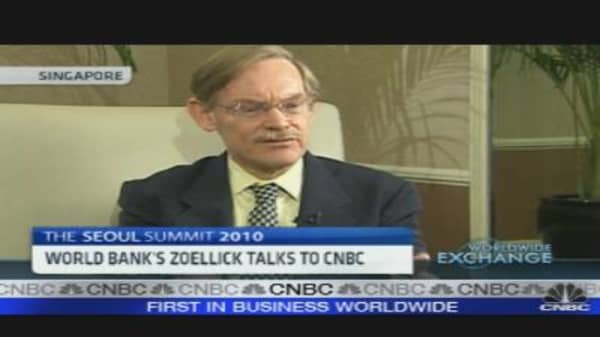Gold is the "elephant in the room" that must be addressed by policymakers, as it's being used as an alternative monetary asset because of unease about the strength of developed economies, Robert Zoellick, president of the World Bank, told CNBC Wednesday.
What "the price of gold has been telling people is that there is a lack of confidence in some of the fundamentals growth policies," Zoellick said.
"The golden elephant in the room, whether people recognize it or not, is being used as an alternative monetary asset," he said.
The price of gold hit record highs of more than $1,400 a troy ounce this week as investors sought the relative security of the precious metal amid a volatile currency backdrop and growth concerns in many developed countries.
Zoellick sparked a debate over a return to using gold as a peg for valuing global currencies Monday in an article written for the Financial Times. But Zoellick told CNBC the comments were misunderstood and he is not in favor a return to the gold standard.
Instead, Zoellick called for a more international currency system that could involve the dollar, euro, yen, pound and yuan. He said in the FT that gold could be used as an "international reference point of market expectations about inflation, deflation and future currency values."
The dollar's dominance on world markets is changing and now multiple currencies are playing a greater role in the trade of assets, Zoellick told CNBC. Because of this, there is the need to create a framework of greater cooperation, he added.
Gold is "the alternative currency which bankers can't debase," which can act as a form of protection against systemic risk, in the financial sector, David Roche, global strategist at Independent Strategy, told CNBC.
Economist Nouriel Roubini told CNBC that a return to the gold standard would not work because it would make central banks unable to fight inflation or deflation and unable to boost employment.
A return to gold backed currencies would also cause practical problems as the distribution of gold reserves across the world is extremely skewed, Andrew Milligan, investment director at Standard Life, told CNBC.com.
"I would be extremely surprised if governments around the world could agree to such an idea," Milligan said.
Central banks would have to "organize a gigantic buying of gold" in order to set up a gold-backed arrangement, which is a major obstacle, Jonathan Garner, managing director and head of global emerging market strategy at Morgan Stanley, told CNBC.




